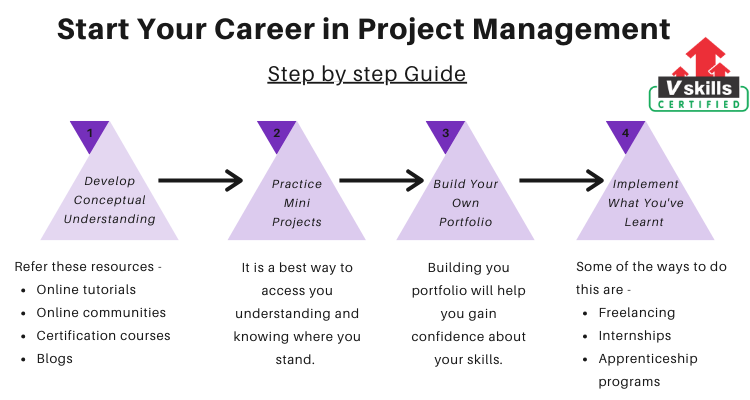Project managers are constantly in demand: whatever the industry, skilled professionals are always necessary to plan and deliver the work. Project management involves skills and techniques to manage a project’s budget, scope and schedule. The project management domain covers the project management skills as needed by the industry, covering strategic management, project finance, using IT tools for project management and managing international projects.
Let us look at what project management field has to offer!
What is project Management?
Project management core principles include planning, organization, security, control, management and management of resources and tasks to accomplish specific business objectives. Project Managers identify strategies for initiating the projects, assessing and understanding the project needs, analyzing and bringing in the required professionals and monitoring work progress.
Why to choose project management as your career?
Project managers are in high demand. The Institute for Project Management (PMI®) expects to open 22 million new job opportunities in project management by 2027. Some of the reasons to choose your career in project management are –
- In a wide range of industries, project managers are required. Although it is common in the IT sector, project-oriented activities are also common in the commercial, petroleum and gas, finance and insurance, construction and utilities industries worldwide.
- Salaries are competitive for project managers. The average national project manager salary, accordingly, is $59,680. According to Glassdoor.
- Study enables future project managers to acquire the different qualifications necessary to carry out the numerous tasks required for a task. There are plenty of possibilities for progress. Experienced, expert, certified project managers expect salaries to double, or higher.
- Really, project managers can change. Not only moral but the bottom line of the company have a direct effect. This is a fairly nice reward in addition to the enviable salary.
- Some see the management of projects as the training of CEOs. Both roles are faced with similar challenges: work with and for investors, project teams and customers, and deal with many of the same pressures and financial constraints.
- Project managers are learning at all times. They need to constantly update their understanding of processes and structures, new markets, technologies, products and services, and clients.
Areas You can discover after learning Project Management
These are some of the career opportunities you an discover after learning about project management and can take your career to new heights –
Project Co-Ordinator
Ideal for those who are just beginning in the industry. You will be an assistant to the project manager instead of being responsible for this. This allows you to find out more about the role. It also helps you gain experience when you take over the role of project management yourself. You have the chance to continue your training. This will allow you to apply for higher ranks later.
New Product Development Project Manager
For people with an accurate analytical attitude this is appropriate. You are not only involved here in developing a product, but also in marketing and marketing. Naturally, which industry you choose to participate in determines for which projects you are responsible.
Construction Project Manager
In recent years, while the construction industry has seen a decline, many companies still seek people with the skills and experience to fulfil these roles. Depending on the size of the enterprise for which you work, the projects differ a bit.
Project Manager in Information Technology
In our lives, technology plays an important part and the IT project manager is also involved. It is here that the IT Department operates effectively and cost-effectively. In this type of project management, you need a certain set of skills to work with. The best thing is that you can practice these skills when you are online.
Environmental Research Project Manager
Are you fond of environmental protection? Then you can participate in this project management field. Your responsibilities differ greatly from project to project, just as with all project managers. You must also coordinate personnel and arrange the tasks they are to perform in conjunction with designing and creating projects plans.
Become an adviser
Since working as a project manager for many years, this is the career way to go down. The key benefits of such a career change are that the projects for which you are employed are picked. This ensures that you face even more challenges and that work is more exciting. You can also decide whether and when you want to work. If you don’t want to set up your own company, consider searching for a business with such facilities.
How can you start your career in Project Management?
It is very much important to have a decent beginning with proper assets and learning material to be acceptable at something. Therefore, you initial steps towards learning must be apt in order to be pro in this field. Let look at some steps that you can take in order to begin your learning process –
Step 1 – Learn about the basics and Develop Conceptual understanding
Before you can become an expert in those areas, you must first create a solid base. And before you get to the practical portion, you’ll need to have the right applied skills. Everyone starts somewhere. If you want to have a good career in this area, you must start tiny. To obtain a complete understanding of the definition, you can consult the following resources:
- Firstly, Online Tutorials for project management
- Also, Certification Courses from verified sources such as Vskills, Coursera, Udemy and so on.
- In addition, Online communities
- Moreover, Blogs and study material from experts in this field and many more.
Vskills also provide Online tutorials, certification courses and free practice tests for the same. You can check them out on our official site.
Step 2 – Practice Mini Projects
It is important to practice if you want to land in a good place. It’s also a great way to figure out where you are when it comes to putting your expertise into practice. Experience can help you outlast other things in practical aspects such as the application of concepts in projects. You can complement your learning by reading blogs and tutorials on various websites to better understand the practical aspects.
Step 3 – Build Your Portfolio
Building a portfolio will help you build confidence in your abilities while also providing you with a forum to put what you’ve learned into effect. Your portfolio demonstrates your ability to execute and plan different codes, as well as how well you execute your management skills. These activities should involve a number of datasets and leave readers with fascinating tidbits of information that you’ve gathered. Your portfolio doesn’t have to be about a single domain; find domains that attract you, and figure out how to bring them together.
Step 4 – Implement your skills in Real world
It’s important to put your skills into practice and that’s why you’ve spent so much time learning how to do it exactly! It’s also important that you remain current and continue to work on and develop your own abilities. Some specialized courses can also demonstrate that you have advanced skills. You are invited to attend as well. The following are some examples of how you can develop your skills:
- Freelancing
- Internships
- Apprenticeship programs
The above steps will help you to get this domain started. It’s a long way to go, however. You can take an advanced course to reach a new level of skills.
On the Job Responsibilities
Some of the responsibilities that a person who is project management professional is required to carry out on the job are as follows –
- Decides which qualifications for the project are needed
- Sets the working budget
- Leads meetings to track the progress of the project
- Sets the project and all sub-projects timeline and time frame
- Decides how the job is done
- Progress reports to interested parties
- Manages the team and organization’s ethos
Market Demand
Project management is in fact in high demand according to Burning Glass, with 282,081 work posts available in the past twelve months. The deadline for such positions is 34 days and the field is expected to expand by 8% in the next ten years.
Project managers, managers, senior executives and students will benefit immensely with the Project Management by showcasing their project management skills. Job seekers looking to find employment in project management or management departments of various companies, students generally wanting to improve their skill set and make their CV stronger and existing employees looking for a better role can prove their employers the value of their skills through this domain.
In the short and long term it seems to be very opportunistic when you are breaking out of project management right now. Businesses of all sizes and styles need people who can genuinely fight projects from start to finish.
Average Salary
The success of a project is primarily on a project manager’s shoulders and hence its demand has risen across industries. According to PMI, project managers are requested more quickly than employees with an average salary of US$ 72,481 a year for every other job. Vskills Certified Project Management candidates will find employment in MNCs, corporates like Deloitte, Amazon India, Protivity, Fidelity, Tech Mahindra, Capgemini and Accenture.
Those with just one partner graduate degree, the median salary of a project manager is $54,900, compared to $84,800 for bachelors. The average salary of project managers for the 0–2 year experience is $56,000, while those with 9+ years’ experience will receive a median salary of $103,000. Similarly, those with lower experience are often (foreseeably) paid less.
Future of Project management
For project managers this is nothing new, but as we go into 2020 and beyond this project management pattern is growing. When you introduce a piece of hardware or software, something new is in place. The PMI defines companies as “the capacity for an individual to adjust, handle, and integrate technologies depending on the need of a company or the project at hand.” The technology ratio of their workers is being emphasized more and more. In other words, how well you can adapt and integrate it effectively in the project management process to emerging technology, such as AI and automation.
Get started and discover the career opportunities in the field of Project Management. Hurry up and try free practice tests now offered by Vskills.in!






